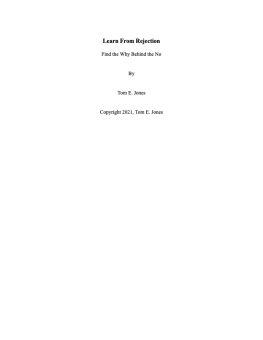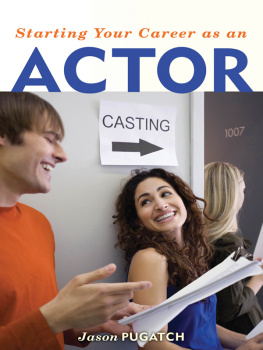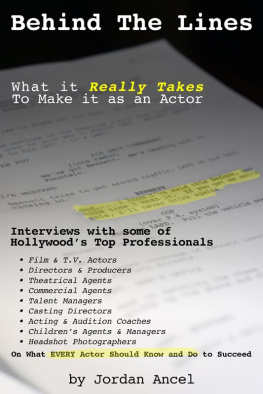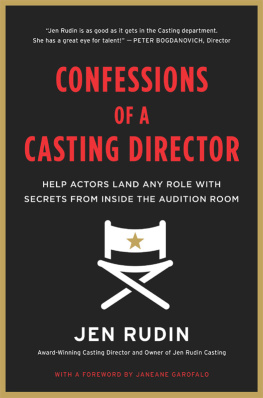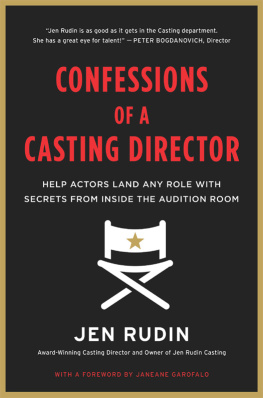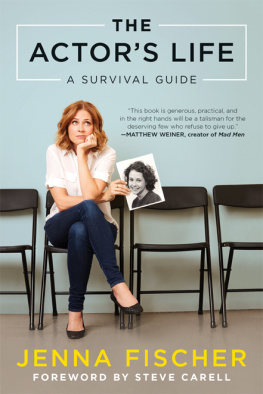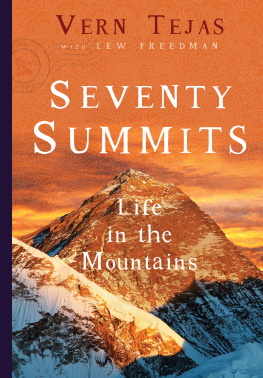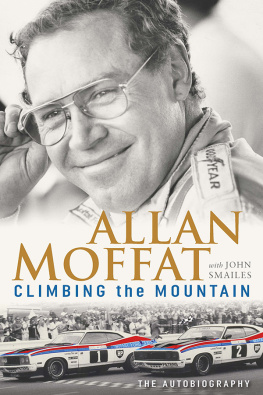Once upon a time, a young innocent came to the Big City.
He was ignorant, which he hated. He was insecure, which he hated. He was unaccomplished, which he hated.
He didnt know anyoneor didnt think he knew anyonein Show Business, and he spent little time trying to explore or remedy that.
Without consulting anyone, he found a photographer to take his first headshot. Again without consultation, he chose his look: blond bangs/wispy mustache, and dressed in a black turtleneck against a black backgroundyielding a photograph of a disembodied head of dubious employability.
He stood in endless lines to audition for shows without a clear idea of what they were looking for. At a chorus call for sophisticated, soign dancer-singers for Irene, he belted out 32 bars of The Pirate King from Pirates of Penzance.
When he made connections with people who actually had a place in the world of Show Business, he didnt spend any time maintaining or strengthening those connections.
He turned down jobs he was offerednational tours, pre-Broadway tours, regional theatreand never wrote the directors or casting agents a note of explanation or apology.
He made no concerted effort to save money or create a rainy-day fund.
He made mistake after mistake.
But...
He learned from his mistakes.
He figured out what workedand what didnt.
He created a network of supportive friends and professionals.
He went on to make millions of dollars working as an actor in all areas of Show Business.
He became well-known, well-respected, and perhaps even more important, comfortable in his own skin.
That young innocent, of course, was... Seth Rogen.
No, it was Nick Wyman, and it is my fervent wish that this book may mitigate some of your ignorance and insecurity and perhaps put you on the path to accomplishmentto success in both life and acting.
Perhaps with a few pointed inquiries we can get you your money back on this book or at least save you from years of misguided toil.
How much do you want to be an actor? The critical response is A lot! or More than anything! If you answer Sort of, or A bit, or I dont know, thats a prime indicator that the acting life is not for you.
The usual advice proffered to those considering an acting career is, If theres something else you think you might like to do, do that. But if you have a strong desire to be an actor, go for it. People frequently say, If you really want to be an actor, dont let anybody talk you out of it. I say, If anybody can talk you out of it, youre not going to be an actor. Because people will try to talk you out of it. The Business itself will try to talk you out of it.
Often, acting seems like a never-ending stream of rejection. No is the default setting. And this makes a certain amount of sense: if 20 people audition for a role, 19 are going to be told no. And sometimes that 20 people is more like 100; thats a lot of nos. And thats not counting as nos all the people who wanted to audition but couldnt get seen.
When Cameron Mackintosh was bringing Andrew Lloyd Webbers massive West End hit The Phantom of the Opera to Broadway, thousands of actors aspired to be in the show. Most of those aspirants never even got seen for the show, but the casting office did see hundreds and hundreds of them, probably a hundred or more just for the roles of Firmin and Andre, the two opera house managers. Out of all those nos, I was one of two who got a yes. So, it can be done. Ill tell you more about that later. (I shall repeat this annoying little phrase, a trick to keep you working your way through my prose, so frequently that I shall henceforth merely use ITYMATL. It is an acronym, not a Mayan archaeological site.)
I want to be rich and famous.
If you want to be an actor so you can become rich and famous, you are aiming for an infinitesimally small and unlikely target. Its like saying, Im going to law school so I can become a US Senator or Im joining the Air Force so I can be an astronaut. Yes, some law school grads become senators; yes, some members of the Air Force become astronauts; and yes, some actors become rich and famous. The vast preponderance do not.
I love the laughter and applause and the acknowledgement of the audience.
I can relate to this one (as can, I think, all actorsperhaps all humans.) An audience is an actors necessary collaborator in Theatre, and there is a profound satisfaction in moving them to laughter or tears, to eliciting their applause, to winning their approval. It is intoxicating and many performers crave it.
There is perhaps a psychological element to this. In Chicago, Fred Ebb writes for Billy Flynn that his clients went onstage because they never got enough love in their childhood. Whether one got little love or lots of love as a child, it is gratifying to get the approval and appreciation of audiences and critics. But audiences and critics are fickle and fallible: if you live for the bravos, laughs, and applause, you may well die at the silence and indifference. Better to develop self-appreciation and self-esteemand Ill tell you more about that later (ITYMATL).
My greatest creative pleasure is in discovering why people behave as they do and representing that behavior truthfully.
Im not sure I believe you, but thats a pretty swell reason.
I have the best time working with other people to find the best way to tell a dramatic story.
This is a pretty terrific reason, and it is part of what keeps actors in the Business in the face of modest encouragement and substandard financial remuneration.
My freshman year in college, lured by a flattering recruiting letter that I realized only in retrospect had been sent to everyone of my height in our class, I went out for crew. It was arduous training (running up and down the steps of the stadium with a 50-pound sandbag slung around my neck) and a difficult sport to master. I was generally terrible; I would get off rhythm and hit the guy ahead of me in the back with my oar handle. However, when it was working and I was in sync with the other guys and our coxswainit was magical. The boat would literally skim along the Charles River in proof of the expression the sum is greater than its parts. It was rare (for me) and enormously gratifying.
Acting frequently gives me that same gratification: being a part of, contributing to a greater-than-myself enterprise, whether in a small or a large way.
There is nothing else I love to do as much as acting. I cant think of anything else I would be happy doing.
This is a powerful statement and will stand you in good stead when the Business begins assaulting you with rejections. Commitment is as strong a predictor of success in acting as it is in a marriage. Well, if he/she doesnt work out, I can always get a divorce is a likely precursor to that divorce; If Im not making $100K in two years, I can always sell insurance is a sure path to selling insurance.
There is nothing wrong with selling insurance (just as there is nothing wrong with acting). Non-acting jobs are not only okay, they are usually necessary to supplement an actors income. Part of being an actor, for almost every actor, is doing something else as well.
Lets say you have come up with a successful satisfying answer to why do you want to be an actor? Now lets take a look at the odds against you.
There are 51,000 members in Actors Equity, the stage actors union, and 160,000 members in SAG-AFTRA, the screen actors union. Allowing for overlap, thats 180,000 professional actors or about 4,000 actors in every single-year age cohort between 20 and 65: 4,000 professional 20-year-olds, 4000 professional 21-year-olds, and so forth.


